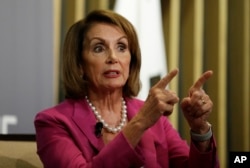U.S. voters will head to the polls in two months to elect a new Congress and to render a midterm judgment on the often controversial and polarizing presidency of Donald Trump.
The political stakes are enormous, especially for a president who has undone much of his predecessor's agenda but who could face a similar fate if Democrats recapture control of one or both congressional chambers on November 6.
A central question before voters is whether they want to continue with a Trump agenda backed by compliant Republican majorities in the House of Representatives and the Senate, or hand partial or full control of the legislative branch back to the Democrats, marking a return of divided government.
Campaign series
As a sorely divided nation prepares for the historic midterm election, VOA beginning today will publish a series of video and text reports gauging stakes in the election and exploring in detail the issues that define the campaign.
Those issues include immigration, jobs and the economy, gun control, abortion, Russian interference in the U.S. election process and the fast-mushrooming scandals engulfing Trump and his administration. These stories can be found on a US Midterm 2018 special page.
The stakes
With the course of his presidency literally on the line in November, Trump has been an aggressive force on the campaign trail, touting Republican candidates and warning against a Democratic takeover of the House.
"This election is bigger than any one race," Trump told supporters at a recent rally in Charleston, West Virginia."It is about whether we want to continue the amazing progress we have made for America or whether we want to surrender that progress to the forces of extremism and obstruction."
Rallying the base
Among those in the audience was coal miner Kevin Abbott. "I believe the way Trump believes," he told VOA. "I believe if people quit road-blocking him, I think he can do amazing things. He's already done so much."
Last week, Trump warned a group of evangelical Christian ministers at the White House that a Democratic takeover of Congress would be disastrous, suggesting Democrats would quickly move to undo his tax and economic policies, his tough crackdown on immigration and his actions to cut regulations on the environment and energy.
"They will overturn everything we have done and they'll do it quickly and violently," he said, according to The New York Times.
Fired-up Democrats
As much as Trump hopes to spur Republican turnout in November, he is already firing up Democrats who appear to be eager to vote in the midterms.
Democratic turnout has surged in recent primaries and special elections, and party activists point to the unifying effect of opposing Trump as a key motivator.
"This man has got to go!" shouted critic James Obergefell, a gay-rights activist, during an anti-Trump protest at the White House last month, spurring cheers from dozens of like-minded critics.
Democrats are counting on resistance to Trump to help them retake control of the House.
"We now know that this partisan fight has become a fierce battle for the soul of America, and we, the people, have to win this battle," said billionaire and Democratic fundraiser Tom Steyer, who is leading a push to have Trump impeached.
Daunting landscape
Historically, the president's party loses seats in midterm elections, and experts predict that 2018 is likely to follow that pattern.
"When you look at the overall landscape, what you do see is a very typical midterm election shaping up," said George Washington University political analyst Lara Brown. "And that is that historically speaking, the president's party does not do well. The country does, to a certain extent, see the midterm elections as a check on the president's power."
Trump has already warned Republicans about the consequences of Democrats taking back control of one or both chambers in November, and with good reason, according to Brookings Institution scholar William Galston.
"Number one, no more Republican-only legislation," Galston told VOA via Skype. "And number two, House Democrats would then command the mechanisms of oversight, which is after all one of the principal responsibilities of Congress."
Some analysts predict a Democratic House would push for impeachment at some point, but the party is split over whether to highlight that as an issue in the midterm campaign.
Trump as central issue
Even Trump allies acknowledge that the midterm vote will be seen by many as a referendum on the president, and several openly welcome it.
"This is an up-or-down vote — it couldn't be clearer," former Trump chief strategist Steve Bannon told Associated Press Television. "If we keep the House, President Trump's program will continue on. If we lose the House, then [Democratic House leader] Nancy Pelosi will try to grind his program to a halt."
All 435 House seats are up for election this year along with 35 of the 100 Senate seats and 36 state governorships.
Gallup pollster Frank Newport said there is little doubt that Trump is a galvanizing force for both sides in the November vote.
"I think Republicans will actually bring him up. Some of them will say, 'Vote for me because there is going to be a move to impeach Trump if we have more Democrats in the Congress,' " Newport told VOA. "And Democrats clearly will say, 'Vote for us because we will oppose Trump's policies.' So I think he clearly is a central figure in this election."
Trump's approval rating could drag down Republican hopes in November. Real Clear Politics has Trump's average approval at 42 percent favorable and 54 percent unfavorable, which is on the low side for an incumbent president.
Gallup polling going back to 1946 has shown that when a president's approval rating is below 50 percent, the president's party loses more than 36 House seats on average.The Democrats need to pick up 23 House seats in November to regain control of that chamber and two seats to take back the Senate.
Polling edge
Democrats have an edge in what is known as the generic ballot poll, which simply asks voters which party they will support in November. The Real Clear Politics polling average shows Democrats with about a 9 percentage-point advantage over the Republicans.
Republicans appear better positioned to hold on to their slim 51-49 majority in the Senate. Democrats hold 24 of the seats up for election this year, while Republicans hold nine. Two other seats are held by independents who caucus with Democrats. Ten of the Democratic-held seats are in states Trump won in the 2016 election.
The odds of Democrats winning back the House majority are "considerably better than 50-50," said Brookings analyst Galston."I would guess that 2018 would be something like 2006 [midterms] for Democrats, when they did very well and picked up 32 seats."












